You know how people always say, “No one in India discusses ‘these’ kinds of topics!”, meaning people here don’t just go around shouting ‘masturbation’, ‘orgasms’, and—aiyo tauba—vagina!
Well, you really think that’s true?
Then how come today marks 15 years since women in India have been performing The Vagina Monologues? That’s hundreds of performances across the country, from Mumbai and Bhubaneshwar to Goa and Chennai to Chandigarh, to just name a few. Fifteen full years of women naming their vaginas, singing chooth songs and having full-on orgasms on stage, Malayalam orgasm, Hindi orgasm, Marathi orgasm! (You can hear them below). So who says we don’t talk about sex? We do, you just have to listen!
The Vagina Monologues is a play written by American playwright, feminist and activist Eve Ensler. Like you might’ve guessed from the name, it consists of a series of episodes or monologues that deal with experiences that centre around the vagina: menstruation, orgasms, masturbation, and giving birth, and lots of other experiences too, like abuse. It’s considered one of the most important pieces of political theatre in the world.
Directors and producers Mahabanoo Mody-Kotwal and Kaizaad were so impressed when they saw the play in America that they felt they simply had to bring it to India too. They were nervous, but good thing they took the risk because the play’s been such a huge success here. As of April 1, 2017, Mahabanoo and Kaizaad have been putting up the English version of the play for 15 years, and the Hindi version, translated by Ritu Bhatia and JaideepSarkar, for 10.
Agents of Ishq spoke to several of the amazing actors who have performed The Vagina Monologues for over the last 15 years about their experiences, anxieties and thoughts about doing the kind of play that you would expect to invite lots of controversy, and varied reactions: both from the audience and their families. As they spoke we could hear the passion and excitement in their voices. Their stories are heart-warming and hilarious.
MAHABANOO MODY-KOTWAL, has been performing this play for 15 years in both Hindi and English. (Mumbai)
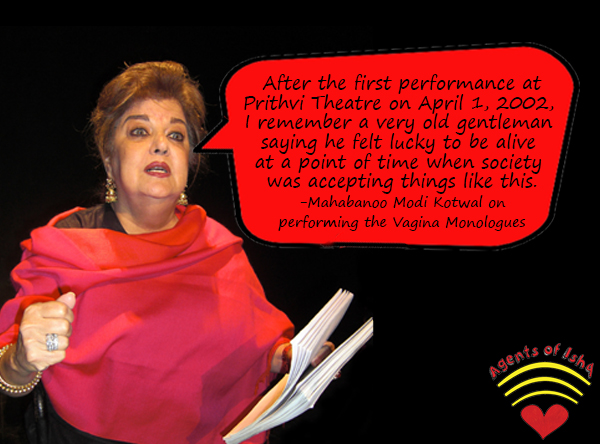
My son went to see the play in America and suggested that we do it here, and in the beginning I was extremely cautious, given the attitude of people here. But then I went to Atlanta and watched the show, and I was absolutely blown away, and knew we had to perform this in India, because of the audience’s immense reaction. We were an audience of 1,500 people, and the way people accepted it was really amazing. I mean, I didn’t know how it would be in India, but I felt it was something we had to do. It took us about a year-and-a-half to get the rights for the play, after which we got permission from the Maharashtra theatre censors. Because you know, Maharashtra is one of the only states that requires certification for theatre. They didn’t delete anything, which is wonderful!
After the first performance at Prithvi Theatre on April 1, 2002, I remember a very old gentleman after the first performance saying that he felt lucky to be alive at a point of time when society was accepting things like this.
Now, In 2017, we have 11 or 12 people in the cast and the demand is so great that we do many shows on the same day—so we use everyone who’s available. We’ve also had celebrities support us and lend their voices, which is exciting.
Most reactions to the play are lovely actually. We pass around a notebook amongst the audience after the performance, and I’d give you anything if you can find even two negatives comments in there! I do remember one person though, from within the theatre community actually saying that the play was “titillating”. Titillating! Don’t you think, if you find this play titillating, there’s something wrong with you? Because it’s about abuse. Recently I met a girl, and she asked me if I remembered her. I didn’t, and you know what she told me? Ten years ago, after we performed at the Hyderabad airport, she was sitting next to me, and she was crying, and I asked her why. She said she was getting divorced, and I had told her at the time, ‘“10 years from now, meet me and tell me how happy your life is because of this decision”. So she came to meet me. That was really lovely.
One change I notice now is that more people come backstage after the show and share their own stories.
PRIYANKA SETIA, 31, performs the play in Hindi and has been performing for three years.
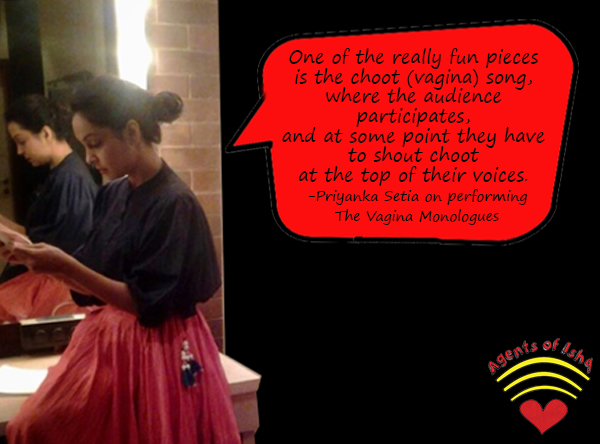
I’m a Hindi-speaking girl from UP; a Delhi girl. And Hindi is my first language. The Hindi version uses words that we all know, so it’s real, and hard-hitting. Even the piece where we say all the different words for vagina, these aren’t words that people don’t know — it’s yoni. After a certain time and age, everyone pretty much knows all these words.
I do a piece called Mother; in Hindi it’s called Main Thi Vahaan, and I compare the yoni to a heart: how big it is, and how it forgives, and gives birth to a whole new human being. It resonates very strongly with women, and with men too. Men have come up to me crying after that piece; it’s really special. Sometimes, like when we perform in Dharavi or Prithvi, the audience connect with us so strongly. And they speak to us after the show, and cry for hours and tell us what’s happened to them. Some people say that they have a newfound respect for the vagina.
One of the really fun pieces is the choot (vagina) song, where the audience participates, and at some point they have to shout choot at the top of their voices. Sometimes they’re really loud, sometimes they only say it softly, but then we of course egg them on.
Listen to Priyanka read a passage from the Hindi version
I remember once I was working with another director and I said I was going to a performance of The Vagina Monologues, and he started saying this play put the topic of abuse in a bad light and some stuff like that. But other than an odd judgement like that, the play is just so lovely, that once you see it and see how the audience and actors feel, and how comfortable they are, you can’t help but like it. And anyway, the play is one-and-a-half hour long, so it’s better to just be comfortable while you’re sitting there!
My father still hasn’t seen it even though I have done hundreds of shows. When he’s in town and I have a performance I don’t tell him it’s The Vagina Monologues, but hey, someday, maybe!
RUCHIKA CHANANA, has performed it in Bangalore
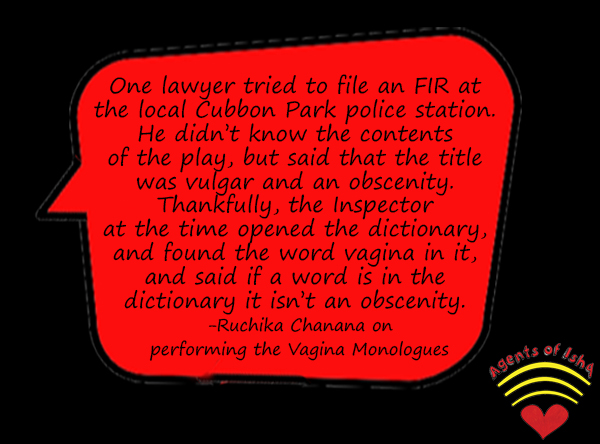
I directed an enactment of the play in 2002, in Bangalore. We did three shows, two at a bar called 180 Proof, which has closed down now, and where the Hard Rock Café has come up. We did another performance at the National Law School of India.
It was the first performance in India, and we were really anxious. It was a completely different time in India altogether. We did a private performance, so we had a fairly curated crowd, but there were still people in the crowd invited by the people who ran 180 Proof who were a bit outraged, or who said it was too “bold” [laughs]. There was even one man who worked at the bar, an urbane sort of guy, who refused to say the title of the play! He would keep saying TVM, until one day I just confronted him and said, say vagina! And he did.
When we had the performance at 180 Proof, we had blocked the front entrance to the bar with the set, so people were coming from the back. At one point during the second performance the cops came banging on the door, and someone had to handle that, I don’t remember how they did. We also had one lawyer who tried to file an FIR at the local Cubbon Park police station. He didn’t know the contents of the play, but said that the title was vulgar and an obscenity. Thankfully, the Inspector at the time opened the dictionary, and found the word vagina in it, and said if a word is in the dictionary it isn’t an obscenity. Like I said, it was a totally different time.
We had done a series of workshops with the actors before the play, and I remember that added a lot to our whole experience. We would set them tasks like go home and look at your own vagina, or have an orgasm, explore your sexuality. And this really helped in the actual performance.
Looking back, I feel like The Vagina Monologues is a maybe bit simplistic now, but at that time, it was something really different, and something that really needed to be done. I remember when we performed it, I did a short introduction, just to explain what was happening and what the play was, to set the scene. I suppose such a thing wouldn’t be necessary today.
SWATI DAS, 32, has been performing for three years, in both Hindi and English
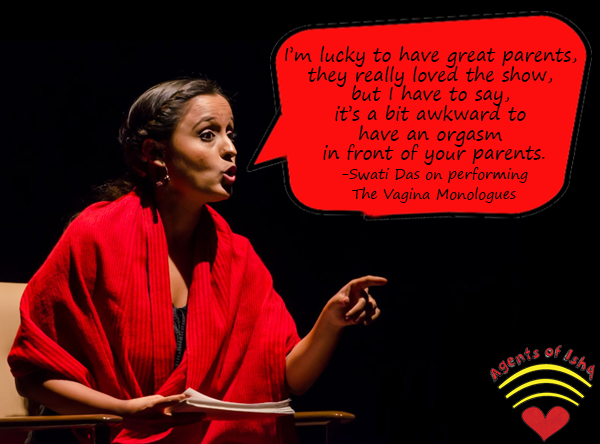
I’ve been doing The Vagina Monologues for three years. The first time I did it, I did the Hindi version for the policewomen of Bombay, and that was really special. I was a little apprehensive about how they’d take it, like I was wondering would they be a very serious audience, but they were just roaring with laughter, and kept coming backstage and taking photos with us.
I love doing both the Hindi and English versions. The Hindi version has been translated and contextualised so well, that you wouldn’t believe the stories are not from India. What worked very well I feel was the added piece on menstruation that we do only in Hindi, not in the English version, which deals with all the Indian taboos around menstruation, and says things Ma ne mujhe ghar se bahaar alag se kothri mein rakha (My mother made me sit outside the house, in isolation, during my period). Or there’s one time where we use the word mayaan, which is a Rajasthani word for sheath, I think it’s a very evocative word for vagina. The other nice thing about the Hindi version is that it can be performed for different classes of audiences, and still be relatable to them.
Some people are uncomfortable about the title, but when they see the play, they realise how important it is! I was wondering how my parents would take it though. I was performing in my hometown in Ahmedabad, and I was doing the piece where I have to moan and have an orgasm on stage. I was backstage joking with Mahabano that I was going to have to have an orgasm in front of my father! I’m lucky to have great parents, they really loved the show, but I have to say, it’s a bit awkward to have an orgasm in front of your parents.
DILNAZ IRANI performs in both Hindi and English, and has been performing for seven years.
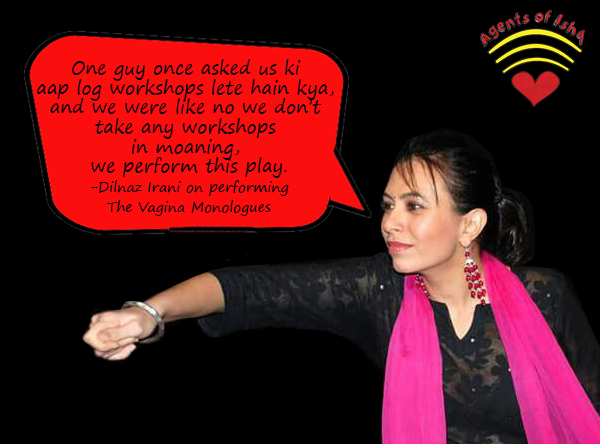
I’ve done hundreds of performances of the show. I remember early on though, in 2010, when we were rehearsing, I remember there was one piece where I had to shout madarchod (motherfucker), and I had never had the opportunity to curse like that on stage before, so I was a bit apprehensive. I remember asking Mahabano, can I shout behnchod (sisterfucker) instead? And she said no, absolutely not, scream it out loud!
I remember one time I was walking on the road, and this guy comes up to me and says, oh I’ve seen you in a play! And I do a lot of theatre, so I asked him, which play? And he said, you know, wohwala. And I really didn’t understand him, I was like “hmm sorry?” And he went, “monologue monologue!” Even after watching the play he couldn’t just say the name—it was funny. One guy once asked us kiaap log workshops letehainkya, and we were like no we don’t take any workshops in moaning, we perform this play.
Listen to Dilnaz
LEKHA NAIDU performs in English, with Indian inflections (remember that Malyalam Moan?)
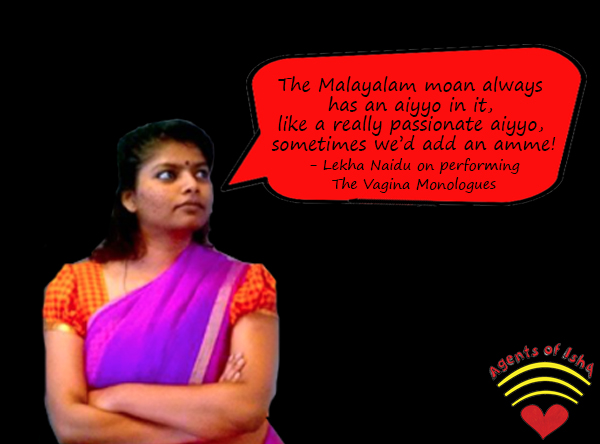
Chennai. February 2014. The Vagina Monologues was the first piece I was directing, so I was quite nervous. We were also wondering if there’d be some negative reactions, social or political, to performing such a play, and we even told the security guards to be on the lookout, but no such thing happened at all.
Even though we performed it in English, we had made some adjustments, in terms of accents and inflections. One of the pieces has all these different moans, and I remember, the Malayalam moan almost brought the roof down! The Malayalam moan always has an aiyyo in it, like a really passionate aiyyo, sometimes we’d add an amme, but it was different each time.
AKANCHHA KARKI, performs in Nepali
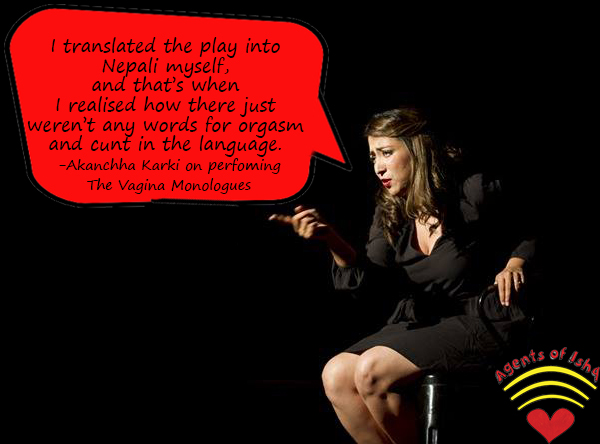
In Kathmandu, Nepal, where we were performing, the theatre going crowd is either working class, or very upper class—one or the other. We didn’t want to perform exclusively for the upper classes, so we really wanted to do it in Nepali. I translated the play into Nepali myself, and that’s when I realised how there just weren’t any words for orgasm and cunt in the language. So we had to be clever with the way we translated. So for example, for the word cumming, we used majja, which is fun or pleasure, similar to what it means in Hindi, and had to use our tone and voice to convey the true meaning.
I was really anxious before doing it. We also faced a lot of opposition. We called our group the Madalenas, and I remember a group of men who were opposing us said next year they would do a Penis Monologues under the name Ladalenas. In Nepali, laado means penis.
I remember another guy who heard about what we were doing, and he went and read about feminism and watched some videos or something, and then told everyone that this has to be stopped because we are radical feminists. Others would say that I was some girl who had gone to India and then returned, and was “corrupting” the minds of our native women. One day before the show I almost called off the whole thing!
But the response was amazing. We had so many amazing people come and speak to us after the show, including some of the very people whose reactions I was worried about, like the poet Viplop Pratik. He’s fluent in both English and Nepali, so I was worried what he’d think about our translation, and he came backstage and told us what a great job we’d done.
It was transformative for the audience, but also for the performers. I remember, some of the performers were married and didn’t know the meaning of the word orgasm, and rehearsals would sometimes turn into sex ed workshops!
In one of our four shows, my parents were in the audience, and they sat separately. My mom was in the front row with the women, and my dad was all the way in the last row. For the piece where the audience shouts back cunt, we used the Nepali word ‘puturu’, which is a child’s word for vagina. I remember looking out at the audience at that point, and my father was the first to shout puturu, and I was like oh my god, what is happening!

